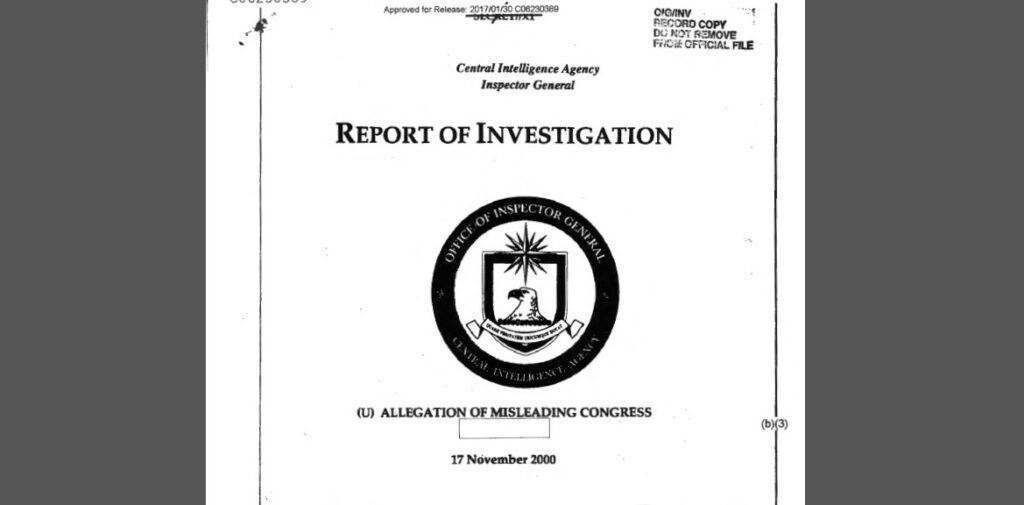This report was requested in June of 2009, and then again in July of 2014. It was finally declassified and released in February of 2017.
Background
In May 2000, an Agency employee who requested confidentiality approached the Inspector General (IG) with secondhand information .that CIA Executive Director (ExDir) David Carey misled Congress when he testified before the House Permanent Select Committee on Intelligence (HPSCI) and also in a
letter Carey sent on 23 March 2000 to the Senate Select Committee on Intelligence (SSCI) Staff Director. The employee claimed he represented a group of senior Agency officers who were afraid to approach.the Office of Inspector General (OIG) for fear of retribution. The employee said the Senior Intelligence Service officers were unwilling to come forward on their own to report the allegation because they feared their names would become known to senior Agency management and they would suffer adverse career consequences.
The employee said he was told by another CIA officer that in February 2000, Carey chaired a meeting attended by, among others, Associate Deputy Director for Science and Technology (ADDS&T) James Runyan. Runyan attended the meeting as a substitute for Joanne Isham, the Deputy Director for Science and Technology (DDS&T). The employee learned, after this meeting, that Runyan reported Carey was “furious” and said the Agency was not going to talk to Congress about its policy concerning “internal taxation.” Carey reportedly said the Agency is to “close ranks” on the issue of not discussing its internal taxation policy with Congress. The employee explained that the term “internal taxes” refers to fees levied on CIA components by Agency corporate management to
fund other programs and needs.
The employee learned that [ REDACTED ] who served in the Office of the Directorate of Science and Technology (DS&T) as the Chief of the Planning and Resources Group-was instructed by Runyan to communicate with certain officers within the DS&T t9 “close ranks” and tell them that internal taxes are an internal matter that is out. of bounds for discussion with the Congressional Intelligence oversight committees. The employee understood that [REDACTED] drafted a Lotus Notes e-mail message to this effect and showed it to Runyan in draft. Runyan approved the message, saying that it reflected what Carey said, and it was sent. The employee said [REDACTED] is suffering retribution for this incident.
According to the employee, Carey appeared at a 16 March 2000 HPSCI hearing and denied any knowledge of the existence of the e-mail message; denied that its statements represented Agency policy; and denied that any subject was out of bounds for discussion with the intelligence oversight committees. Subsequently, Carey sent~o the Staff Director of the SSQ dated 23 March 2000 with [REDACTED] message attached. In the letter, Carey wrote that the e-mail message “does not accurately articulate our policy on dealing with Congress.” The employee believes this is a false statement.
The employee explained that he did not wish to invoke “whistle blower” provisions to report this matter to Congress because he did not have firsthand knowledge of the matter.
Declassified Documents
 CIA/IG Investigation: Allegation of Misleading Congress, 11/17/2000 [93 Pages, 12.3MB]
CIA/IG Investigation: Allegation of Misleading Congress, 11/17/2000 [93 Pages, 12.3MB]
https://documents.theblackvault.com/documents/ig/F-2014-00278-CIA.pdf
Follow The Black Vault on Social Media:

